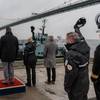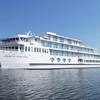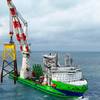Opposition to Inland Waterways Lockage Tax
The American Waterways Operators, the national trade association for the tugboat, towboat and barge industry, criticized the proposal in the Obama Administration's Fiscal Year 2010 budget to replace the inland waterways fuel tax with a lockage tax.
A similar idea was proposed by the Bush Administration and rejected by the 110th Congress. AWO urges Congress to reject it again. AWO contended that replacing the excise tax on fuel that equitably distributes taxes on all commercial waterways users with a lock usage tax would impose disproportionate tax burdens on vessels transiting certain segments of the inland waterways, while other vessels using the system would pay little or nothing.
AWO said this approach would increase the cost of shipping essential commodities such as grain and petroleum and would undermine the nation’s inland waterways transportation system, the most economical and environmentally friendly mode of cargo transportation. Moreover, it would not solve the waste and over-expenditure problems that plague the current system for constructing and funding vital inland waterways infrastructure.
Noting the broad benefits to the nation from its waterways, from commerce to recreation to flood control, AWO President & CEO Tom Allegretti asserted, “Spending tax money wisely cannot occur until bad habits have been reformed. While it is industry’s responsibility to pay its fair share of taxes, it is the government’s responsibility not to waste tax dollars. The lock usage tax proposal doesn’t achieve either goal. Imposing this tax would unfairly burden the mode of transportation that has the smallest carbon footprint and still has unused capacity. It is totally counterproductive.”
AWO said imposing a lockage fee now would short-circuit a promising government-industry initiative currently underway to develop a new Capital Projects Business Model for the nation’s inland waterways infrastructure. AWO reported that the Capital Projects Business Model is a comprehensive, consensus-based capital investment program that will ensure that resources and processes are in place to achieve a safe, reliable, cost-effective, and environmentally sustainable inland marine transportation system, along with the necessary funding stream. The model will be presented to Congress later this year for consideration in the development of the 2010 Water Resources Development Act.













